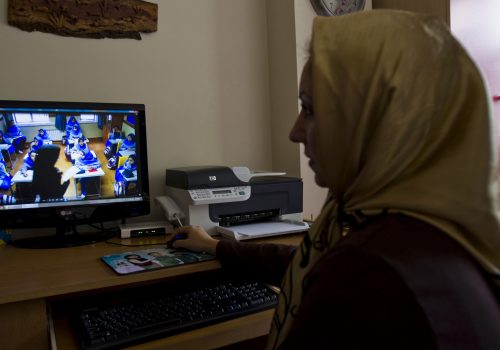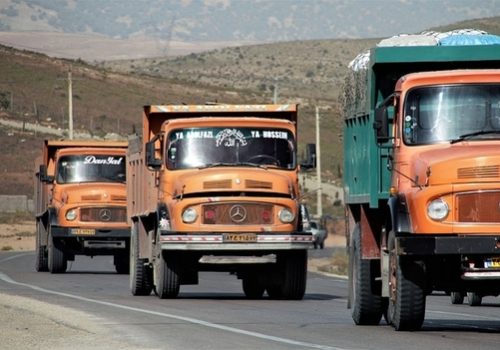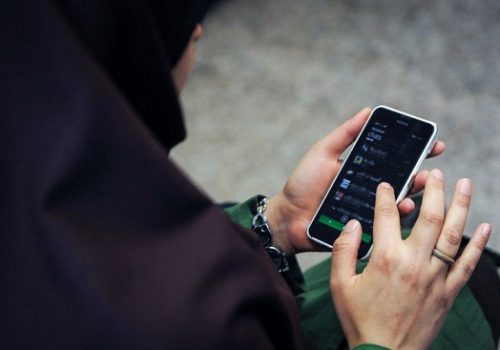Iranians fear a permanent internet blackout is in the making
Fresh off a week-long internet blackout that left the nation reeling, President Hassan Rouhani triggered a new wave of anxiety among Iranians fearing they soon may be all but shut off from the global community.
While in parliament on December 8 to officially hand over the budget bill for the upcoming Iranian calendar year (March 2020), the president said internet bandwidth speed has multiplied twenty times compared to when he first assumed office in 2013.
“So we will continue this process in order to develop our internal National Information Network in a way that our people won’t need foreign [networks] to meet their needs,” Rouhani said, adding that this is an order issued by Supreme Leader Ayatollah Ali Khamenei.
The National Information Network (NIN) is the term used by Iranian authorities to refer to the country’s intranet supported by domestic servers in order to avoid the negative implications associated with “national internet.”
The NIN has been under development for years—in part a response to the 2009 post-election protests known as the Green Movement. While theoretically it could have positive implications for Iranian businesses and citizens affected by US sanctions that severely restrict access to services offered by American tech giants—including Amazon, Google and Apple—it has also raised concerns that it may permanently replace the internet.
For many Iranians, Rouhani’s comments in parliament were the final nail in the coffin.
“Rouhani has left no room for doubt this time. He has clearly spelled out the establishment’s intents concerning the internet,” said Siavash, a 41-year-old founder of an online retail business.
“The way I see it, it’s now just a matter of time, and we have to base our future plans on this.”
An anonymous Twitter user, who identifies themself as a computer programmer, wrote that companies have been ordered to move all servers inside Iran within three months to be able to operate in the event that there is another internet blackout.
Iranians got a taste of what life with the intranet would look like when on November 16, a country-wide internet blackout was rolled out by order of the Supreme National Security Council. During the week-long shutdown, connectivity level flatlined at 5 percent according to NetBlocks, a nongovernmental organization focusing on cybersecurity and internet governance.
During that time, bank transactions and some public services, including the online systems of government ministries, were still available through the NIN. Even a select number of domestic businesses, including major ride-hailing app Snapp, were allowed to reconnect to the world wide web.
The blackout was in response to protests prompted by the tripling of gasoline prices overnight that gripped twenty-nine of Iran’s thirty provinces and claimed at least 208 lives and prompted at least 7,000 arrests, according to Amnesty International. Iranian authorities said it was a necessary move to derail plans of “rioters” and operatives guided by the United States, Israel and Saudi Arabia.
Rouhani’s comments came only weeks after the protests and blackout, which left many Iranians in shock and despair. Some see being cut from the outside world as the final straw.
“I’ve always wanted to stay in my own country, hoping for a better future, but lately I’ve been questioning that decision a lot,” explained 28-year-old Rana.
“My entire work will be jeopardized, and all our collective lives will be disrupted if there’s no internet. We’ll turn into North Korea,” added the graphic designer who accepts projects from abroad.
Concerns of another major disruption with heavy implications are only compounded in an economic environment defined by high inflation and unemployment. Iran’s economy has taken a serious hit since US President Donald Trump unilaterally reneged on the nuclear deal with world powers and re-imposed crippling sanctions.
Similar sentiments of despair also filled Persian social media as users tried to grapple with the idea of a future where their digital lives could be turned on its head. This is while thousands of websites, along with almost all major social media platforms—Facebook, Twitter, and YouTube—are already blocked in Iran.
Some turned to dark humor, as Iranians are prone to do in difficult situations, to process the grim prospect.
“In a while they’ll close the country’s doors and create a ‘national abroad’ in Qom or Mashhad or somewhere else and say anyone who wants to go abroad can only go there,” one user tweeted.
Meanwhile, mixed signals are coming from different elements of the establishment have further confused and frustrated the Iranian people.
On the one hand, officials demonstrate a willingness to replace foreign-based services with domestic versions.
General Gholamreza Jalali, who heads Iran’s Passive Defense Organization a body tasked with combatting threats, has maintained that the country is in dire need of a fully operational NIN. The network could counter the influence of Google-owned Waze, which he described as an “Israeli tool” given that the GPS navigation software was designed in Israel. Jalali believes the app played a role in intensifying traffic in Tehran during the protests.
On November 9, Jalali called on parliament to pass regulations that would obligate the government to complete the NIN by the end of the next Iranian year (March 2021).
Despite this, authorities have tried to reassure the public that they regard the internet as a vital part of the country’s future and economy.
After partial access to the global internet was restored on November 23 following the protests, Iran’s Minister of Information and Communications Technology Mohammad Javad Azari Jahromi released a video message apologizing to the public and conveying that the government understands the need for global connectivity—even though the initial blackout happened under his authority.
“I believe that living without the virtual space and without connecting to the global network is no longer imaginable,” he said.
Only a day earlier, the US Treasury Department imposed sanctions on Azari Jahromi for his role in the “wide-scale internet censorship.”
Responding to the news, the minister vowed that he would continue to advocate for access to internet. However, officials in Azari Jahromi’s ministry pushed back and defended the necessity of the NIN.
“Lack of depending on international infrastructures and the global internet network does not equal lack of necessary connections,” tweeted Mohammad Jafar Nanakar, the head of the ICT ministry’s legal department—adding that the NIN could help decrease the vulnerability of local infrastructure.
As Iranians responding to Nanakar’s tweet pointed out, the definition of “necessary” and who defines it is a crucial point and precisely what has millions of Iranians concerned for their online future.
“As if all the uncertainty and isolation we already deal with weren’t enough, now we have to worry if we’ll literally have our connection to the outside world cut off,” Rana said.
Maziar Motamedi is a Tehran-based journalist focusing on the Iranian economy. Follow him on Twitter: @MotamediMaziar.
Image: Technicians monitor data flow in the control room of an internet service provider in Tehran on February 15, 2011. (Reuters)


